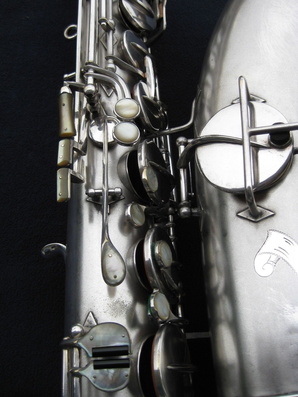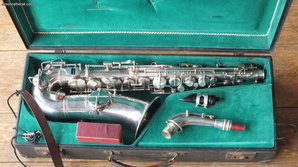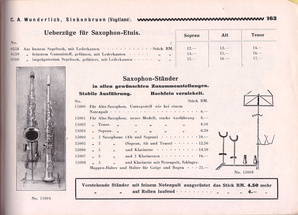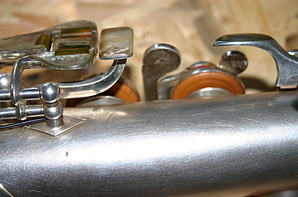
Translated and transliterated from the www.saxofonservis.eu website:
About the "Naked Lady" EngravingCarl August Wunderlich (1826-1911) began in 1854 with the production of brass instruments under the brand CEA.
At the end of the 19th century, the company in Siebenbrunn (bordering Markneukirchen), the company switched to selling different types of musical instruments via the wholesale market [ed. I think we could call this "stenciling"].
In the first half of the twentieth century, Wunderlich was one of the major wholesalers in Vogtland. The company existed until 1966. Wunderlich also sold the copyrighted Hüller trumpet with top-operated rotary valves. (DRGM recognition received on September 4, 1929, number 1,088,742.)
According to a post on www.saxophonforum.de, the engraving of a nude female standing on a globe and holding something over her head was supposedly a signature engraving style from Fritz Reichel. The engraving itself is called, "Die Frauengestalt," which is translated to, simply, "The Female Figure."
Supposedly, Fritz Reichel did engraving for several companies in the Vogtland area.
According to posters on www.museum-markneukirchen.de, Fritz Reichel also created the logo for ALPIMA in 1945, which was a stringed instrument business. It's possible that this is the logo he created -- I've not been able to find newer examples of ALPIMA instruments.
One of the hits I got when searching Google was a genealogy page. The location does fit as do the above comments about ALPIMA. Therefore, it's probable that it's the same person and Fritz Reichel was born in 1882 and died in 1945.
My thanks to Helen from Bassic-Sax.info for her assistance in helping me get this far into the story.
Fatal error: Uncaught mysqli_sql_exception: Table './bassicsax_petepiwigo/kah_history' is marked as crashed and last (automatic?) repair failed in /home/bassicsax/public_html/pix/include/dblayer/functions_mysqli.inc.php:132 Stack trace: #0 /home/bassicsax/public_html/pix/include/dblayer/functions_mysqli.inc.php(132): mysqli->query('\nINSERT INTO ka...') #1 /home/bassicsax/public_html/pix/include/functions.inc.php(538): pwg_query('\nINSERT INTO ka...') #2 /home/bassicsax/public_html/pix/index.php(373): pwg_log() #3 {main} thrown in /home/bassicsax/public_html/pix/include/dblayer/functions_mysqli.inc.php on line 132





